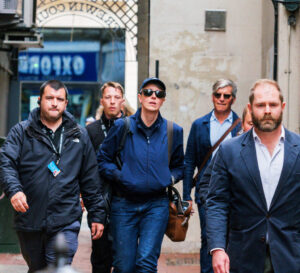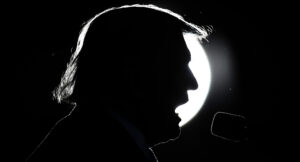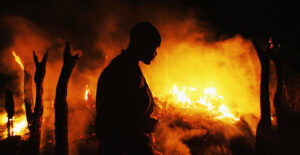We live in a time of ideological exhaustion. Our doctrines and ideals lie broken in pieces all around us and never fit into a whole. Jagged bits of Marxism and anarchism, nationalism and liberalism, clutter the landscape, tear at our feet and impede our way as we stagger onward in search of some promised land. Yet there can be no promised land, no future, no past, in such a psychotic jumble of first principles. All we can muster is rage at the structures around us, so inexplicably shattered, and the urge not to repair but to obliterate them totally — to negate them into dust.
Identity is the ruling orthodoxy of the day. Wesley Yang calls it the “successor ideology”, but it is less an ideology than a cockpit of grinding, wounding grievances contradicting one another: a perpetual conflict machine. Any piece of it, such as racial justice, can make perfect sense, but the whole dissolves into incoherence when it becomes clear that the highest ideal, equity, is a weasel word used to mask an inability to reconcile opposites.
Definitions of equity, whether provided by the White House or by elite universities, are baffling, I suspect intentionally so. Terms such as “fairness” and “anti-racist” are thrown around — but somehow this adds up to “investment” and “allocating resources” favouring designated grievance groups. Equity, in practice, means absolute equality of outcomes in all transactions, measured not in the liberal tradition, between individuals, but harking back to a more primitive outlook: between castes to which we have been assigned by birth and fate.
How does this work? The first step is simple enough. Government must intervene in every transaction to assure equal outcomes. If white males have an average “privilege value” of 100 and black males have an average of, say, 50, the government must take from one and give to the other until both share the identical value of 75. But what of black women — shouldn’t they receive a higher multiple than black men? And what of many Asian-American groups that have achieved a higher average than white males — should they be downranked and de-grievanced? And what of more intangible factors such as education, a good marriage and family life, raw ability at work and play, a sense of humour, happiness? Can government make the “historically underserved” laugh and the overserved cry?
The purpose of ideology is to lay down rules of the road that lead to a specific vision of the just society. Identity is the opposite of that. Equity is just a three-syllable sound. It explains nothing and resolves nothing. Put aside obvious questions about regressing to a system of lineage-based justice that throws overboard the legacy of individual rights, or about the overwhelming display of state power required to impose that system on an unwilling public. I’m talking about pure functionality.
Whatever identity is, it doesn’t do the work of an ideology. Stitched together from the bits and pieces of moribund ideas received by the educated class, identity exemplifies the contemporary preference for bowing to the applause of an imaginary audience over the hard work needed to connect two consecutive thoughts. The causes of this intellectual flabbiness are frankly puzzling. The more credentials we heap on ourselves, and the more information we gather, the less connected we seem to reality.
Unnoticed, a vast chunk of the context that once measured our well-being has crumbled away, leaving us sick at heart and disoriented. Suicide and drug overdose deaths are rising. Many who are ostensibly healthy have been sucked into the moral vacuum of digital politics, substituting vehemence for meaning, posturing for productive action. Now and then, some shallow misfit detonates into a massacre of innocent strangers. Nihilism, the will to destroy whatever stands, is the guiding instinct of the day. Ideology, let us not forget, is also a creed, a set of beliefs dependent on faith, as much as it is a system of ideas — and the sterility of our moment, of which identity is a pathological example, may be derived less from intellectual failure than from a chronic and agonising spiritual condition.
***
Every ideology worthy of the name envisions a perfect end-state: a utopia. The kingdom of God may be near at hand or far in time and distance, real or fantastic, but in every case it performs an important function: it engenders hope and faith. If only we play by the accepted rules, human relations — that cauldron of selfishness and misery — will at last be reconciled. After resurrection, Jesus preached, we will be “as the angels are in heaven”. Under pure communism, the brutal strength of the state will wither away and we will each be given according to our needs. American democracy, in its high modernist phase, aimed for the Great Society; under more conservative hands, it looked to be a shining city on a hill.
In this sense, the cult of identity is exceedingly utopian: believers judge established institutions against perfection, then reject the lot. But this is a journey without a destination — utopianism without an actual utopia. Identity is an engine that runs on rage and repudiation. Deprived of a satanic enemy to rail against, it stalls. If Donald Trump retired tomorrow to a Trappist monastery, the zealots of identity would drag him back out. If all white males and other oppressors vanished in a great culling at the end of days, the whole point of “identity” would explode in a puff of smoke. If grievance groups existed only to express their own separateness, social life would fall apart in a rush.
In the dark heart of its repudiation, identity repudiates itself, denying, by a parasitical necessity, the possibility of progress. It can thrive only so long as injustice advances. The impulse, then, is to remain implacable, irreconcilable, striking blows against anything that stands, in an ecstatic frenzy of nihilism that, when properly understood, is a form of suicide.
Reality, of course, is a tad more prosaic. I recently encountered a young man at the supermarket. He was a mass of Zoomer hair and tattoos, and when he turned, in bold white letters on the back of his black hoodie, I read a defiant message: “RISE UP. RESIST. REVOLT. REBEL.” Below that, in more modest script, a warning: “To not speak up is death.”
I considered the meaning of this apparition. Rise up, resist, revolt, rebel — against what? Everyone and everything, I suppose. Speak up — on behalf of what? That was the wrong question. You speak up to resist, revolt, strike blows. You stand forever against. Yet there he was, this would-be destroyer of worlds, at the fruit counter, contemplating the cantaloupes. Apparently, even nihilists have appetites.
***
In The Will to Believe, William James observed that certain explanations about the nature of things are “live options” while others are “dead options”. James was a psychologist. He understood that history and culture condition the mind, driving many theoretically possible propositions out of consideration. Does the universe rest on the back of a turtle? That was once a live option, but no longer. Is there no God, only atoms? That statement will get you shot in Kabul but elicit yawns in Harvard Square.
There has been, in the 21st century, a great slaughter of live options. Truth and knowledge are largely mediated: we receive them from some trusted authority. But trust in the mediators has utterly collapsed and a fatal crisis of authority has spread to every subject. We now dwell in the Tower of Babel. Hope and faith, under such conditions, must dissolve into a shrieking, incomprehensible noise. The mindless contradictions of the cult of identity, and the dismal poverty of our ideological imagination, follow directly from these disasters. Religion, patriotism, love of place and family — these are dead or dying options. Conservatism and liberalism, Right and Left, are tribal stickers detached from any serious content.
The path to Communist revolution, wrote Marx in the Manifesto, “involved the most radical rupture with traditional ideas”. I was born into a world alive with hope and faith, fertilised by a running quarrel between ideas old and new. Utopia was not only possible; for many, it was inevitable. Revolution, these people thought, would purify the human race. Radical ideology was wholly oriented to that transcendent moment. In democracies, socialists and liberals believed we could get to the same place by peaceable stages. Artists and poets everywhere longed for the “bliss in that dawn” Wordsworth had experienced in Paris.
Then came the night. In December 1991, the Soviet Union went out of business. Rather abruptly, revolution became a dead option. The cry for it fell terminally quiet because faith was lost in its magical powers of transformation. Insofar as ideology had usurped the place of religion, the death of revolution was like the death of God. For radical thinkers, bereft and bewildered, deprived of direction, it felt like murder. A seething anger replaced coherent projects of political change. Pierre Rosanvallon describes the consequences of the end of “the idea of revolution”: “To be radical is to point a finger of blame every day; it is to twist a knife in each of society’s wounds. It is not to aim a cannon at the citadel of power in the preparation for a final assault.” Blaming and knife-twisting, I note, accurately describe the central rituals of the cult of identity, a post-utopian conduit for rage rather than change.
A dead zone like the present moment might be conceived of as a great silence, a darkness, an emptiness that sucks the life out of new ideas. We emerge from nowhere and have no idea which way to turn — no idea whether the world is round or flat, whether it’s run by God or atoms, what words like “justice”, “integrity”, or “happiness” mean in practice. Every option at hand is either dead or in the process of dying. To attempt a coherent explanation of such a graveyard of dreams would be an exercise in despair. Anger at least has a pulse, and if intense enough feels like a facsimile of the spiritual life.
But all this, I think, amounts to a half-truth. The graveyard isn’t quite still. Dead options and failed ideologies twitch, moan and clutch at us zombie-like, stopping us in our tracks. We haven’t broken free from the past: just the opposite, we are overwhelmed by memory, so that our best thoughts have been thought before, and thought more brilliantly, and tested and exposed in their inadequacies. We seem to lie at the bottom of a century-deep well crushed by the weight and inertia of dead time, where we can accuse one another of being Nazis or fascists or communists, revolution lingers with its impossible promises, Ronald Reagan smiles over America, Jim Crow persecutes forever, and the Beatles perpetually top the charts. We aren’t empty but overfull. The Tower of Babel isn’t a silence but an unbearable noise.
The reflex to smash blindly at society, to obliterate the present and abolish the past, must be understood on these terms. Barbarism, with its true silence and true darkness, has acquired the aspect of utopia.
***
The last surge of ideological vitality in this country took place in the Sixties. That decade witnessed the rise of modern conservatism, destined to swell into a dominant political force in the Reagan years, and of the New Left that announced its arrival in the Port Huron Statement and, after many strange mutations, has become a sort of totemic ancestor to identity. The two movements were each other’s nightmare monster, yet in hindsight it’s remarkable how many goals and assumptions they shared. Both embraced history as an ally, not an enemy, for example. Both partook of that sense of infinite possibilities associated with the American frontier. In politics, both exhibited a Jeffersonian antipathy to state power and glorified a robust, almost anarchistic, individualism.
Hippies and Goldwaterites had more in common than they knew, starting with the conviction that they were making the world over. A newborn ideology is a redrawing of the map — a radical shift in perspective. Doors suddenly swing open that have stood locked for an age. Everything is alive again, even the past, which isn’t repudiated so much as recruited and synchronised to the concerns of the present and future. No part of this need be destructive or nihilistic. It’s just a moving forward and a leaving behind.
Energy from these movements propelled American politics for many years, but inevitably the environment changed and momentum ran out. We are now stuck in the muck. We require explanations and aspirations that address the peculiar character of the digital age, and our inability to produce these is telling. Whatever their intrinsic worth, the ideologies of the Sixties were healthy attempts to change the world: they truly aimed at justice. Our sickness is that we speak of justice but we really crave meaning. We desperately wish to fill the spiritual void left by the decline of religion, community, and family, and when we engage in pseudo-ideological dabbling we are pleading on our own behalf, not that of society or the oppressed — we are praying to a silent heaven that our sickness might be healed. But that is not the province of ideology or politics.
Failure triggers blind rage and the barbaric urge to smash at the tokens of civilisation. This is our predicament, our closed loop. We begin the search for justice by gazing into the mirror of Narcissus but end it as the monster at the centre of the labyrinth.
We might ask how such a deformed and unsatisfying creed as the cult of identity has come to achieve the status of an established church. The answer isn’t hard to tease out. Identity justifies control by those who have lost authority. The institutional elites are held in contempt by the public. Their advice is rejected and their commandments ignored.
By wielding that fuzzy and mutable ideal, equity, the elites aim to regain control of policy and prosecutorial decisions — but also of the education of children, the research of scientists and scholars, the persons and opinions that will be tolerated online, the treatment of the poor and homeless, and ultimately, the words in the mouths and thoughts inside the heads of the common herd. As a bonus, they get to surf a wave of puritanical smugness. They can call dissenters “deplorables” and treat their dissent as a form of racism or homophobia. What could be better?
It may appear far-fetched to portray elite embrace of identity as a 2020s take on Invasion of the Body Snatchers — and in a way, it is. The digital realm is virtually infinite; that’s a lot of territory to conquer and hold down. My point, however, is that the ragged engine of identity has an open road ahead and will continue its suicidal rampage through American life until opposed by a coherent set of ideas.
Disclaimer
Some of the posts we share are controversial and we do not necessarily agree with them in the whole extend. Sometimes we agree with the content or part of it but we do not agree with the narration or language. Nevertheless we find them somehow interesting, valuable and/or informative or we share them, because we strongly believe in freedom of speech, free press and journalism. We strongly encourage you to have a critical approach to all the content, do your own research and analysis to build your own opinion.
We would be glad to have your feedback.
Source: UnHerd Read the original article here: https://unherd.com/






